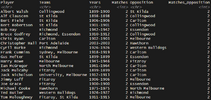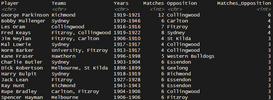RedmanWasHere
Rarely in kitchens at parties.
- Aug 23, 2010
- 27,020
- 29,922
- AFL Club
- Essendon
- Other Teams
- Exers, Gryffindor, Rich+Ess AFLW, Tassie
I love Scotty Lycett but I'm secretly happy he never amounted to anything at Port.
Would've loved him back at WCE for a year of bash n crash
On SM-S908E using BigFooty.com mobile app
UP THE BLOODY COASTERS is all I think about seeing his name.















